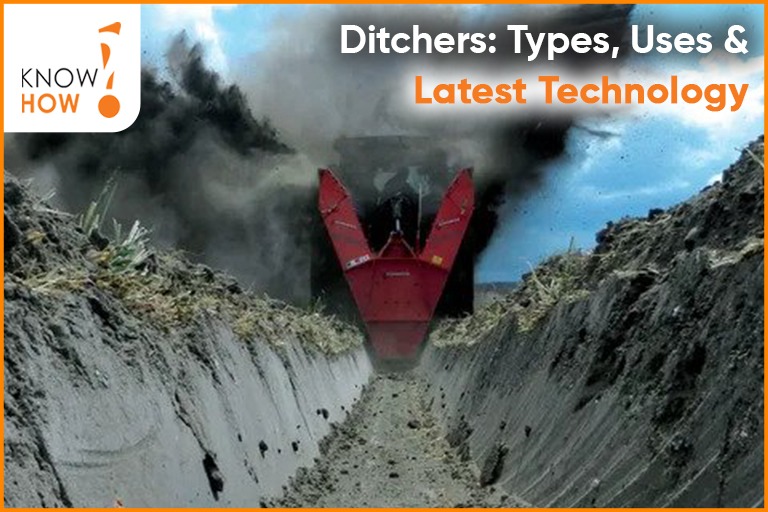Ditchers, also known as trenchers or trench diggers, are specialized machines used in various industries to dig trenches or ditches in the ground. They have revolutionized the process of excavation and have become indispensable in construction, agriculture, and utility installations. In this guide, we will explore the different types of ditchers, their uses, and the latest technology advancements in the field. By understanding the capabilities and advancements in ditching technology, you can make informed decisions and optimize your excavation projects.
1. The Importance of Ditchers in Excavation
Ditchers play a crucial role in excavation projects, providing efficient and precise trenching capabilities. They offer numerous benefits, including:
- Time and Labor Savings: Ditchers significantly reduce manual labor and excavation time compared to traditional digging methods.
- Enhanced Precision: Ditchers provide accurate trenching, ensuring consistent dimensions and alignment.
- Versatility: Ditchers can be used in various applications, including pipeline installation, cable laying, drainage systems, and irrigation projects.
- Increased Safety: Using ditchers reduces the risk of accidents and injuries associated with manual digging.
2. Types of Ditchers
Ditchers come in various types, each designed for specific applications and soil conditions. The three main types of ditchers are chain trenchers, wheel trenchers, and micro trenchers.
2.1 Chain Trenchers
Chain trenchers are the most common type of ditchers. They feature a digging chain equipped with cutting teeth that excavate the soil and create trenches. Chain trenchers can handle a wide range of soil conditions and are suitable for larger-scale projects.
2.2 Wheel Trenchers
Wheel trenchers utilize a large rotating wheel with digging teeth to cut through the ground. They are ideal for shallower trenches and can quickly maneuver in tight spaces. Wheel trenchers are commonly used for small to medium-sized projects.
2.3 Micro Trenchers
Micro trenchers are specialized machines designed for creating narrow and shallow trenches, typically used for laying cables or fiber optics. They offer precise cutting and minimal disruption to the surrounding area.
3. Ditcher Attachments
Ditchers can be equipped with various attachments to enhance their functionality and versatility. Common attachments include:
- Backfill Blades: Attachments that allow the ditcher to backfill the trench after excavation, eliminating the need for additional equipment.
- Vibratory Plows: Attachments used for installing cables or small pipes by vibrating them into the ground.
- Trencher Chains: Different types of chains with specific tooth configurations to accommodate various soil conditions and trench dimensions.
4. Latest Technology Advancements
The field of ditching has seen significant technological advancements in recent years, enhancing productivity, accuracy, and safety. Two notable advancements are GPS and automation and trencher telematics.
4.1 GPS and Automation
GPS technology is now integrated into ditchers, allowing for precise positioning and guidance during trenching operations. This technology ensures accurate trench dimensions, minimizes errors, and increases productivity. Automated systems can control the machine’s depth, grade, and steering, reducing the need for constant operator intervention.
4.2 Trencher Telematics
Telematics systems enable remote monitoring and tracking of ditchers, providing real-time data on machine performance, fuel consumption, maintenance needs, and location. This technology helps optimize productivity, manage fleet operations, and proactively address maintenance requirements.
5. Common FAQs
FAQ 1: What factors should I consider when choosing a ditcher for my project?
When selecting a ditcher, consider factors such as project scale, soil conditions, trench dimensions, available space, and budget. Evaluate the specifications, capabilities, and attachments offered by different models to ensure they meet your specific requirements.
FAQ 2: Can ditchers be used in rocky soil conditions?
Yes, certain types of ditchers, such as chain trenchers with rock teeth, are designed to handle rocky soil conditions. These teeth are more durable and can effectively cut through rocks while excavating trenches.
FAQ 3: Are ditchers suitable for small-scale projects?
Yes, ditchers are available in various sizes, including compact models suitable for smaller-scale projects. Consider the specific requirements of your project and consult with equipment suppliers to find the right-sized ditcher for your needs.
Conclusion
Ditchers have revolutionized the excavation industry, offering efficient, precise, and versatile trenching capabilities. Understanding the different types of ditchers, their uses, and the latest technological advancements allows you to make informed decisions and optimize your excavation projects. Whether you need to install pipelines, lay cables, or create drainage systems, ditchers provide the efficiency and accuracy required to achieve successful results.

